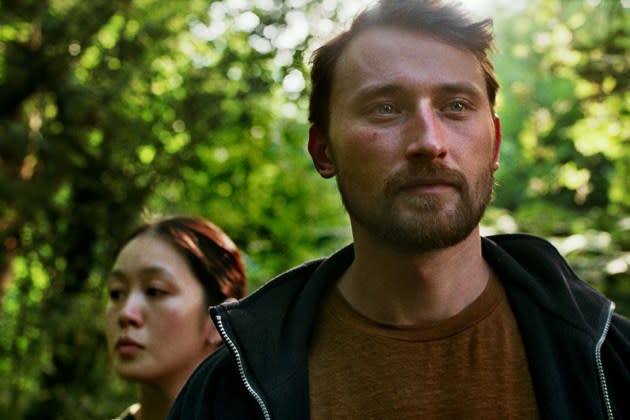‘Here’ Review: Belgian Drama’s Poetic Gaze Is Low-Key and Profoundly Affecting

Alone at dusk in his Brussels apartment, Stefan, a gentle Romanian construction worker, speaks a few words as if to try them on for size. “This is my home,” he says, unconvinced and unconvincing. In Stefan Gota’s subdued and graceful performance, the character’s forlorn ache is unspecified and fully felt. There are sleepless nights, long walks, bowls of homemade soup and heartfelt conversations, rich in silence, with people he knows and others he’s just met. And there’s the visual conversation that frames Stefan’s story, the interplay of windblown greenery and the sharp angles of urban high-rises.
Here is writer-director Bas Devos’ fourth feature (after Violet, Hellhole and Ghost Tropic), named best film in Berlin’s Encounters section and taking its stateside bow at the New York Film Festival. It’s a modestly proportioned movie of quiet magnificence, one that feels spun of gossamer summer light and rooted in unshakeable depths.
More from The Hollywood Reporter
Natalie Portman, Guy Oseary, Gal Gadot Respond to Hamas' Attack on Israel: "My Heart Is Aching"
First Images of Angelina Jolie as Maria Callas Unveiled as Pablo Larrain's 'Maria' Begins Shoot
Working in the 4:3 format, Devos and cinematographer Grimm Vandekerckhove trace Stefan’s wanderings and encounters, and the tender spark that ignites between him and a Chinese-Belgian doctoral student whose focus is mosses, in scenes that have a carefully composed stillness and yet are brimming with life.
In ways that are deft and involving, Here takes its time before zeroing in on its protagonist, first establishing the camaraderie among Stefan and his construction crew buddies as they bid one another so-long, all of them preparing to return to their home countries for the vacation break.
Stefan hints that he might stay in Romania longer — as in, for good — and the next few days of leave-taking blossom into a serpentine ramble through his adopted city. There’s also a sense of taking stock, of tying up loose ends, beginning with the need to empty his refrigerator. Stefan makes a beautiful soup from the vegetables he forages there and divvies it up into containers for friends. The first of these he brings to hotel employee Cedric (Cedric Luvuezo), who heats the potion for them to share, talking about fatherhood and listening to Stefan’s news that a childhood friend is in prison.
That hometown development is of particular interest to Stefan’s older sister Anca (Alina Constantin), a nurse, who hears it over mugs of the veggie concoction when Stefan visits during her nightshift. Her concern for her single, insomniac brother is sincere, and at moments doesn’t quite skirt condescension. Their humor-tinged exchange perfectly encapsulates how much can go unspoken in sibling bonds, as well as what can be missing.
As he traverses the city in his fashion-agnostic shorts, there’s a sharp goad of hopefulness to Stefan’s interactions and his solitude. At a community garden he asks about the mysterious seeds that have somehow landed in his jacket pocket, easily connecting with the woman he meets there. And on a rainy evening at a small Chinese restaurant run by ShuHuan (ShuHuan Wang), he eagerly engages in small talk with the owner’s niece ShuXiu (Liyo Gong, superb in her curiosity and introspection).
But before Stefan’s initial chance to be intrigued by her, Devos has introduced ShuXiu at her work as a bryologist, collecting, studying and cataloging mosses, and in voiceover, relating a dream bordering on nightmare. She dreamed of a world in which she’d lost the ability to name everyday things, language suddenly beyond her reach. “Then,” she says, tapping into the movie’s unhysterical appreciation of life’s curveballs and challenges, “I got up and made coffee.”
When their paths cross again, Stefan is on the long walk to the mechanic’s shop where his car is being readied for the drive to Romania, and ShuXiu is busy collecting and studying moss specimens. Her fieldwork entrances him. He’s drawn into a world of unsung beauty, easy to miss unless you’re looking for it.
In the microscopic patterns ShuXiu offers Stefan, and in the way these two almost-strangers are enveloped by a parkland’s rich green understory, Vandekerckhove’s camerawork is keenly attuned to the story’s synchronous planes, all of them in full, unannounced blossom throughout the film. Nature and science. Spirit and emotion. Mechanics and magic. The delicate tones of Brecht Ameel’s music and Boris Debackere’s sound design complete the quotidian-cosmic universe.
By the end of Here, Stefan has dug up something enchanted on one of his midnight perambulations and, even more memorable, shared an al fresco lunch (his soup the main course) and a conversation about mortality with the Romanian mechanics working on his car.
The vehicle is declared a “worn-out wreck,” with intense sympathy, by the business’ owner, Mihai. He’s played by an extraordinary actor, Teodor Corban (12:08 East of Bucharest, Aferim!), who died in January and to whom the film is dedicated. That this is Corban’s final screen role makes his character’s philosophical observations on aging all the more poignant. But they’d cut deep no matter what. Mihai notes the growing list of things he’ll never do, and, having recently had a defibrillator implanted, declares that “time disappears” under general anesthesia.
Leave it to Stefan, compassionate and, though it might take a lifetime for him to recognize it, wise beyond his years, to understand the overwhelming complexity of the older man’s experience. “They touched your heart,” Stefan says. “That’s a big deal.”
Ditto for Devos’ profound yet miraculously weightless feature. It peers head-on at life’s surprises, devastating and precious alike. And yet, while it touches the heart and lovingly knocks you sideways, there’s nothing precious about it.
Best of The Hollywood Reporter
13 Times Hollywood Predicted the Scary (or Not So Scary) Future of AI
Kim Cattrall and Five Actors Who Made Surprising Returns to a Role
21 Actors Who Committed to Method Acting at Some Point in Their Career

